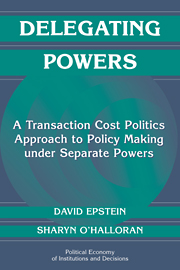Book contents
- Frontmatter
- Contents
- List of Figures and Tables
- Preface
- 1 PATHS OF POLICY MAKING
- 2 CHOOSING HOW TO DECIDE
- 3 TRANSACTION COST POLITICS
- 4 THE DECISION TO DELEGATE
- 5 DATA AND POSTWAR TRENDS
- 6 DELEGATION AND CONGRESSIONAL-EXECUTIVE RELATIONS
- 7 DELEGATION AND LEGISLATIVE ORGANIZATION
- 8 DELEGATION AND ISSUE AREAS
- 9 CONCLUSION
- AN AFTERWORD ON COMPARATIVE INSTITUTIONS
- APPENDICES
- References
- Index
- Titles in the series
AN AFTERWORD ON COMPARATIVE INSTITUTIONS
Published online by Cambridge University Press: 02 December 2009
- Frontmatter
- Contents
- List of Figures and Tables
- Preface
- 1 PATHS OF POLICY MAKING
- 2 CHOOSING HOW TO DECIDE
- 3 TRANSACTION COST POLITICS
- 4 THE DECISION TO DELEGATE
- 5 DATA AND POSTWAR TRENDS
- 6 DELEGATION AND CONGRESSIONAL-EXECUTIVE RELATIONS
- 7 DELEGATION AND LEGISLATIVE ORGANIZATION
- 8 DELEGATION AND ISSUE AREAS
- 9 CONCLUSION
- AN AFTERWORD ON COMPARATIVE INSTITUTIONS
- APPENDICES
- References
- Index
- Titles in the series
Summary
After we had circulated initial drafts of this work, several colleagues inquired how our transaction cost politics framework could be adapted to a comparative setting. Comparative specialists, after all, love to remind us that American politics is the last bastion of area studies. This afterword therefore offers a few speculative remarks about the application of our findings to other governmental systems, both presidential and parliamentary.
The logic of our approach begins with the observation that the U.S. system of separate powers allows two general methods of policy making, through legislative committees or through executive agencies. Since legislators can control which of these two methods is chosen by writing explicit or vague legislation, the location of policy making will maximize legislators' basic political goal of reelection. So the means of policy production is explicable in terms of rational politicians' behavior.
PRESIDENTIAL SYSTEMS
Our theory should be directly applicable to other separation of powers systems (or presidential systems, as they are now called). Here, too, legislative and executive policy making are both possible, with legislators having the option of delegating power or making explicit policy themselves. If our transaction cost politics approach holds elsewhere, we should see legislatures delegating those issues that have the least electoral advantages for them and retaining control over issues whose disposition is most crucial to their reelection concerns.
- Type
- Chapter
- Information
- Delegating PowersA Transaction Cost Politics Approach to Policy Making under Separate Powers, pp. 240 - 244Publisher: Cambridge University PressPrint publication year: 1999

